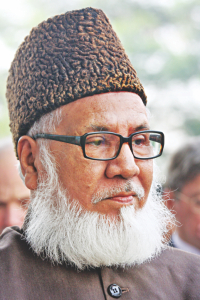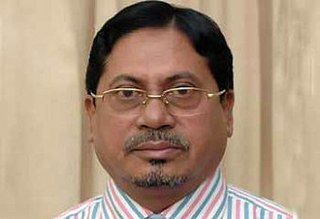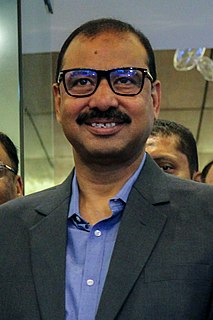Related Research Articles

Siddique ul-Islam, known popularly as Bangla Bhai, also known as Jawad uddin attariAzizur Rôhman, was a Bangladeshi terrorist and the military commander of the Al Qaeda affiliated radical Islamist organization Jagrata Muslim Janata Bangladesh, known in popular usage as the JMJB. Most active in the north-western section of Bangladesh around the Rajshahi region, Bangla Bhai gained a nationwide and worldwide notoriety for bombings and other terrorist activities.

Bangladesh Islami Chhatrashibir, is an Islamic student organization based in Bangladesh. It was established on 6 February 1977. The organisation is generally understood to be the student wing of Bangladesh Jamaat-e-Islami, and several of the leaders of the student organisation have gone on to become notable leaders within Jamaat. The organisation has a significant presence in higher educational institutions of the country such as University of Dhaka, University of Chittagong, Rajshahi University, SUST, BUET, DUET, Medical College. Recently however, the student Organisation has been under pressure from the Bangladesh government led by the ruling party Awami League and its student wing, the Bangladesh Chhatra League.

Motiur Rahman Nizami was a politician, former Minister of Bangladesh, Islamic scholar, writer, and the former leader of the Bangladesh Jamaat-e-Islami.Al-Badr Bangladesh Liberation War. On 29 October 2014, he was convicted and later executed blaming of masterminding the Demra massacre by the International Crimes Tribunal of Bangladesh..Turkey withdraws Bangladesh ambassador after Jamaat-e-Islami leader Nizami's execution (BBC). A large number of Human rights organisations of the world protested against the judical killing of Nizami and declare it an unfair trail aginst Nizami. He was the Member of Parliament for the Pabna-1 constituency from 1991 to 1996 and again from 2001 to 2006. He also served as the Bangladeshi Minister of Agriculture and Minister of Industry.

Muhammad Kamaruzzaman was a Bangladeshi politician and journalist who served as the senior assistant secretary general of Bangladesh Jamaat-e-Islami and was convicted of war crimes during the 1971 Liberation war of Bangladesh. He was executed by hanging at Dhaka Central Jail at 22:01 on 11 April 2015.
The Daily Naya Diganta is a Bengali daily newspaper published in Bangladesh since 2004.
The 2004 Dhaka grenade attack took place at an anti-terrorism rally organised by Awami League on Bangabandhu Avenue on 21 August 2004. The attack left 24 dead and more than 300 injured. The attack was carried out at 5.22 PM after Sheikh Hasina, the leader of opposition had finished addressing a crowd of 20,000 people from the back of a truck. The attacks targeted Awami League president Sheikh Hasina. Hasina was injured in the attack.
Bangladesh Jamaat-e-Islami, previously known as Jamaat-e-Islami Bangladesh, or Jamaat for short, was the largest Islamist political party in Bangladesh. On 1 August 2013, the Bangladesh Supreme Court declared the registration of the Bangladesh Jamaat-e-Islami illegal, ruling that the party is unfit to contest national elections.
Chowdhury Mueen-Uddin, is a war criminal convicted for the killing Bengali intellectuals in collaboration with the Pakistan Army at the time of the Bangladesh liberation war. After the liberation of Bangladesh, Chowdhury escaped from Bangladesh and took British citizenship.

The International Crimes Tribunal (Bangladesh) is a domestic war crimes tribunal in Bangladesh set up in 2009 to investigate and prosecute suspects for the genocide committed in 1971 by the Pakistan Army and their local collaborators, Razakars, Al-Badr and Al-Shams during the Bangladesh Liberation War. During the 2008 general election, the Awami League (AL) pledged to try war criminals. The government set up the tribunal after the Awami League won the general election in December 2008 with a more than two-thirds majority in parliament.

On 5 February 2013, protests began in Shahbag, Bangladesh following demands for capital punishment for Abdul Quader Mollah, who had been sentenced to life imprisonment, and convicted on five of six counts of war crimes by the International Crimes Tribunal of Bangladesh. Later demands included banning the Bangladesh Jamaat-e-Islami party from politics including election and a boycott of institutions supporting the party.
The Ansarullah Bangla Team (ABT), also called Ansar Bangla is an Islamic Jihadi organization in Bangladesh, implicated in crimes including some brutal attacks and murders of atheist bloggers from 2013 to 2015 and a bank heist in April 2015. The gang was outlawed days after the bank robbery by the Ministry of Home Affairs on 25 May 2015. The group has been claimed by police to be linked to Islami Chhatra Shibir, the student wing of Jamaat-e-Islami party in Bangladesh.
Bangladesh has experienced terrorism in the past conducted by a number of different organizations. In the past, both ISIL and other terrorist organizations had claimed to be active in the country however, the Bangladeshi government believes that they mainly operated through local affiliates, before being neutralised by security forces.
Attacks by Islamic extremists in Bangladesh refers to a period of turbulence in Bangladesh between 2013 and 2016 where attacks on a number of secularist and atheist writers, bloggers, and publishers in Bangladesh; foreigners; homosexuals; and religious minorities such as Hindus, Buddhists, Christians and Shias were seen. By 2 July 2016 a total of 48 people, including 20 foreign nationals, were killed in such attacks. These attacks were largely blamed on extremist groups such as Ansarullah Bangla Team and Islamic State of Iraq and Syria. The Bangladeshi government was criticized for its response to the attacks, which included charging and jailing some of the secularist bloggers for allegedly defaming some religious groups; or hurting the religious sentiments of different religious groups; or urging the bloggers to flee overseas. This strategy was seen by some as pandering to hard line elements within Bangladesh's Muslim majority population. About 89% of the population in Bangladesh is Sunni Muslim. The government's eventual successful crackdown in June 2016 was also criticized for its heavy-handedness, as more than 11,000 people were arrested in a little more than a week. Despite the criticism from some quarters, this menace was completely eliminated with no more major attacks or deaths in the subsequent period.

Abu Jafar Mohammad Nasir Uddin aka A J M Nasir Uddin is a Bangladeshi politician and former Mayor of Chittagong City Corporation. He is also the vice president of Bangladesh Cricket Board.

Forced disappearances in Bangladesh denotes to the incidents of persons missing where it is alleged that Government of Bangladesh has direct or indirect sponsorship and involvement with these incidents. According to a Dhaka-based human rights group Odhikar, at least 402 people have become victim of forced disappearance from 2009 to 2017 under the current Awami League administration. These incidents along with extrajudicial killings in Bangladesh has been criticized by The United Nations and human rights groups including Human Rights Watch and Amnesty International. Rapid Action Battalion (RAB), a special paramilitary unit in Bangladesh, is alleged to be behind most of these disappearances even though RAB claimed these allegations to be false. The current Awami League government denies involvement in these forced disappearances even when victims later surface in custody.
Nurul Islam Faruqi, was a Bangladeshi Islamic scholar, businessman, politician and preacher. He was killed by unknown assailants in 2014.
Md Nizam Uddin (Bengali: নিজাম উদ্দিন হাজারী) is an Awami League politician and member of parliament from Feni-2.
Lieutenant Colonel Tareque Sayeed Mohammad is a former Bangladeshi Army officer who was convicted in the Narayanganj Seven murder case. He was the commanding officer of Bangladesh paramilitary force Rapid Action Battalion (RAB)-11.
Attempted assassination of Sheikh Hasina refers to the attempted assassination of Sheikh Hasina, Prime Minister of Bangladesh, by Harkat-ul-Jihad-al-Islami Bangladesh on 21 July 2000 in Gopalganj District. The authorities found the explosives beforehand and thwarted the assassination attempt.
Murder of S Taher Ahmed refers to the murder of S Taher Ahmed, a professor of the University of Rajshahi.
References
- ↑ Rakhit, Maanoj. Muslim India Will be Like THIS. Maanoj Rakhit. p. 243. ISBN 9788189746872 . Retrieved 28 March 2017.
- ↑ "Muhuri Murder". The Daily Star. Retrieved 28 March 2017.
- 1 2 "HC confirms death sentence of 4 in Gopal Krishna Muhuri murder case, 1st Ld". bdnews24.com. Retrieved 28 March 2017.
- ↑ "House of Commons - Foreign Affairs - Written Evidence". publications.parliament.uk. The Committee Office, House of Commons. Retrieved 28 March 2017.
- ↑ Chowdhury, Rashed (17 November 2001). "Nazirhat College principal shot dead". Gulf News. Retrieved 28 March 2017.
- ↑ Karlekar, Hiranmay. Bangladesh: The Next Afghanistan?. SAGE. p. 163. ISBN 9780761934011.
- ↑ "Charges against 12 in Muhuri murder case". The Daily Star. 5 January 2003. Retrieved 28 March 2017.
- ↑ "Hearing of Gopal Krishna Muhuri murder case continues". The Daily Star. 22 January 2003. Retrieved 28 March 2017.